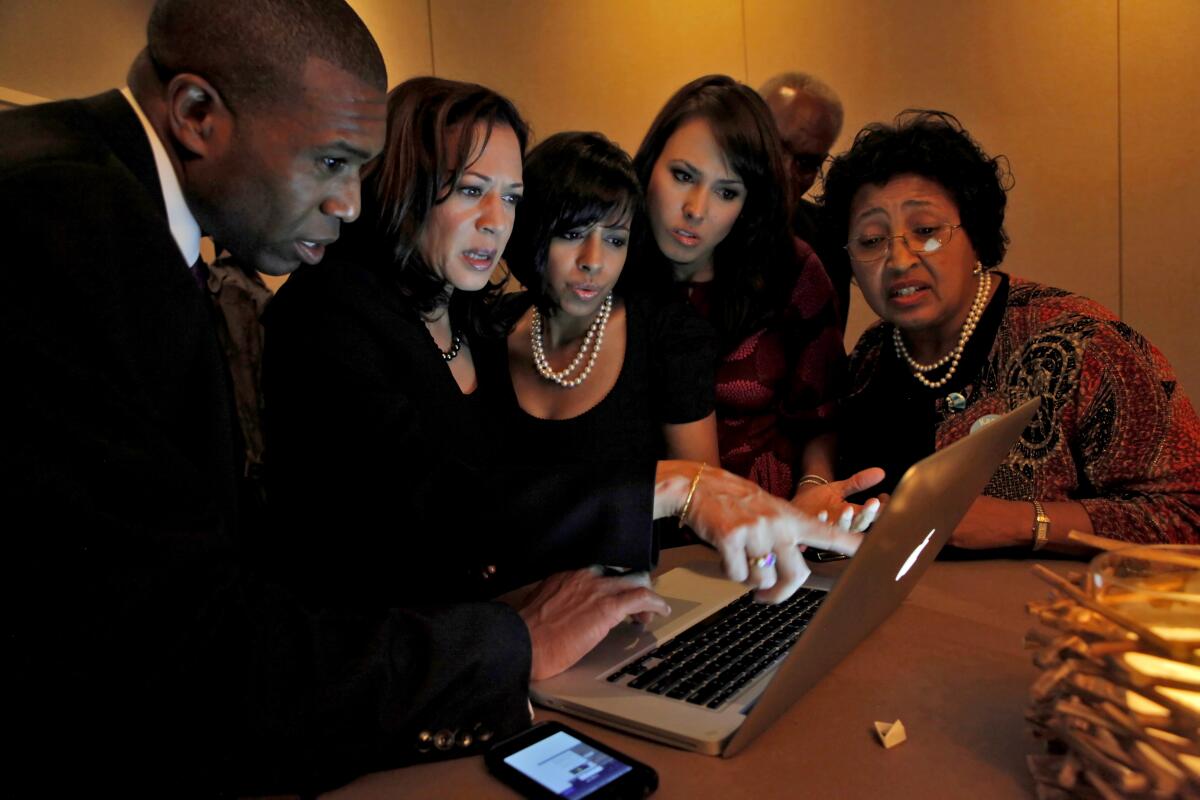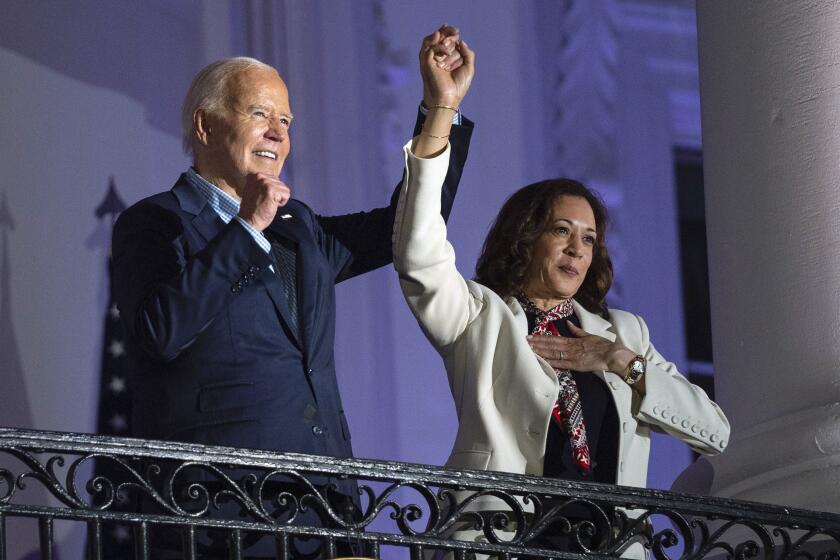Opinion: What Kamala Harris’ run for California attorney general can tell us about this campaign

Smart Republicans could see a day like this coming — and tried mightily to prevent it — back in 2010.
That was the year Kamala Harris, a bright, young, charismatic prosecutor from San Francisco, ran her first statewide campaign, for California attorney general, and ultimately won. The race presaged the politics of 2020 and possibly 2024.
Republicans couldn’t have predicted 14 years ago that Harris would become the presumptive Democratic presidential nominee in 2024. But they could be certain that if she prevailed then, the state’s top law enforcement job would not be her last stop.
Opinion: Can Kamala Harris change a presidential race barely affected by a series of seismic events?
President Biden was in a close contest with Donald Trump despite the debate debacle, assassination attempt and more, reflecting a polarized, entrenched electorate.
In California and other states, after all, the office is a stepping stone: AG stands not only for attorney general but also for aspiring governor. So many Republicans figured it would be easier to stop Harris’ rise before it began.
As Harris opens her presidential campaign, most polls show her trailing Republican nominee Donald Trump. It’s a familiar position for her.
Harris was the underdog when she ran for San Francisco district attorney against a well-known incumbent, Terrance Hallinan, in 2003. She won that race partly by running to Hallinan’s right. The San Francisco Chronicle endorsed her under the headline: “Harris, for Law and Order.”
The idea of nominating Kamala Harris or another candidate despite the primary election results has some accusing Democrats of an antidemocratic coup. They’re wrong.
But she couldn’t diverge too far from San Francisco’s liberal orthodoxy, and she also made a costly promise not to seek the death penalty if elected.
Three months after she took office, a man shot and killed a young San Francisco police officer, husband and father, Isaac Espinoza. True to her word, the new district attorney announced that she would not seek the ultimate punishment. The reaction was swift and brutal.
Sen. Dianne Feinstein spoke at the officer’s funeral and, with Harris seated in a pew at the front of the cathedral, said the cop killer should have been charged with a capital crime. The officers who filled the cavernous cathedral stood and applauded. Harris did not.
Prosecutors won a second-degree murder conviction and a life sentence. But Harris’ decision not to seek a death sentence reemerged in the 2010 campaign, and it probably will in 2024.
Harris was the underdog again in 2010, when she ran against Republican Steve Cooley, a three-term Los Angeles County district attorney who had spent most of four decades as a prosecutor. Some Democratic Party elders publicly predicted Harris would lose to Cooley — not unlike the Democratic pundits who have more recently questioned Harris’ ability to wage a national campaign.
Cooley was a prosecutor straight out of central casting, as Trump might put it, gray-haired and a bit rumpled, who gave the impression of having witnessed more than his share of crime victims’ pain. He was known for bringing successful cases against corrupt politicians and convicted killers alike.
The tea party movement helped Republicans seize control of the U.S. House and state legislatures across the country in 2010. They had legitimate hopes of making gains in California too, and the attorney general’s office was a prime target. A national political action committee spent more than $1 million attacking Harris’ handling of Officer Espinoza’s killing — hoping to stop her ascent before it started.
“If that is a byproduct of defeating her, we’re perfectly happy with that,” a spokesman for the PAC told me a few weeks before the election, which I was covering for the Sacramento Bee.
The Republican primary had also foreshadowed what was to come. Cooley faced a challenge from the right in the person of John Eastman, the former Chapman University law school dean who went on to play a key role in Trump’s failed effort to overturn the 2020 election.
Eastman’s donors included Federalist Society leader Leonard Leo, who would be instrumental in Trump’s nomination of the Supreme Court justices who helped end federal abortion rights. That decision is central to the 2024 election, perhaps even more so given Harris’ likely nomination.
Although Eastman’s primary campaign failed, it didn’t leave the eventual nominee unscathed. Eastman had raised the prospect that if elected, Cooley would take his pension from Los Angeles County on top of his salary as attorney general, for a combined annual pay of roughly $425,000. During Cooley’s only debate with Harris, which I moderated, the Los Angeles Times’ Jack Leonard asked the Republican whether he would indeed take his pension along with his salary. Cooley answered that he had earned the pension and would take it “to supplement the very low — incredibly low — salary that’s paid to the state attorney general.”
Harris saw the answer for what it was — a little too honest — and let it stand. “Go for it, Steve,” she said. “You’ve earned it; there’s no question.” The exchange became fodder for a pointed Harris campaign ad.
In the end, the Republican wave of 2010 stopped at the eastern slope of the Sierra. Harris won by about 74,000 votes out of 9.6 million cast, the narrowest statewide margin that year.
A decade later, Eastman wrote a column questioning Harris’ qualifications for the vice presidency on the grounds that her parents were not naturalized citizens when she was born. A fringe theory, yes, but it caught Trump’s eye and is already being raised anew.
In the coming weeks, Harris will face all kinds of attacks. A few might be substantial, but my guess is that most will border on ridiculous. Can you imagine? The candidate laughs. And she dances!
During Harris’ runs for California attorney general and U.S. Senate, I saw firsthand what kind of candidate she can be: tough, formidable, disciplined. Without a doubt, Republicans should wish they had stopped her when they had their best chance.
Dan Morain is a former reporter for The Times and the author of “Kamala’s Way: An American Life.”
More to Read
A cure for the common opinion
Get thought-provoking perspectives with our weekly newsletter.
You may occasionally receive promotional content from the Los Angeles Times.












